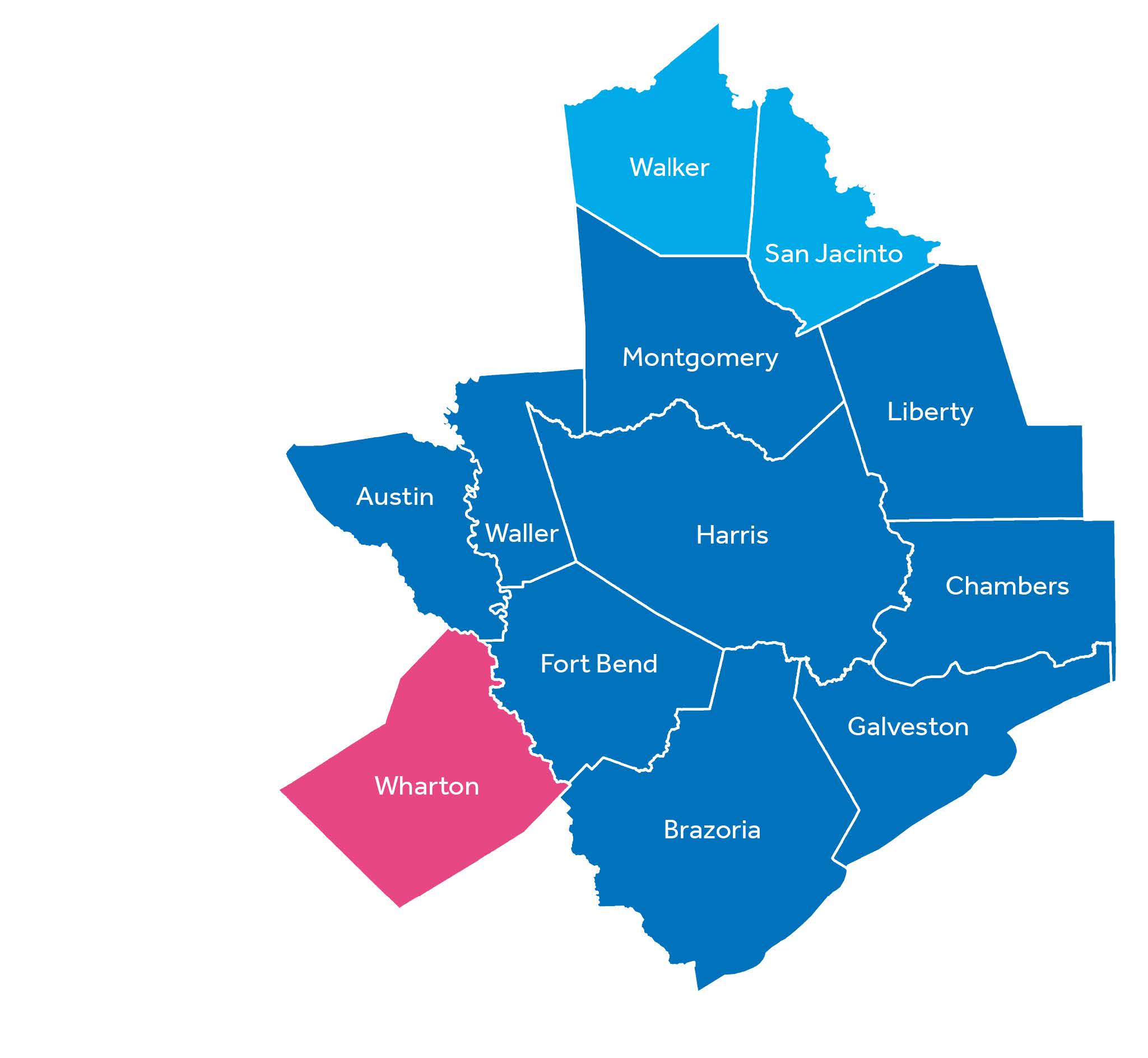Greater Houston Partnership Adds Wharton County to Service Region
Published Sep 03, 2020 by A.J. Mistretta
HOUSTON (September 3, 2020) – The Greater Houston Partnership’s Board of Directors has approved adding Wharton County to the business organization’s economic development footprint. Wharton becomes the 12th county covered by the Partnership, which is the Houston area’s designated economic development organization.
The Partnership will work closely with leaders in Wharton County to identify, recruit, attract and retain investment, companies and jobs for the benefit of the people of the county and the greater Houston region.
“We are excited to add Wharton County to our service region and support the area’s economic development and growth,” said Bob Harvey, president and CEO of the Greater Houston Partnership. “I got to know Wharton County Judge Phillip Spenrath a few years ago and was impressed by his team and his personal enthusiasm for expanding economic opportunities in Wharton County by growing connections with the broader region. Wharton County offers new placement opportunities for certain types of economic development projects, particularly distribution and logistics projects, as well as those tied to supply chains in Mexico and projects that must be in an attainment area for NOx (ozone). We look forward to working with county leaders to leverage this partnership for the benefit of all in the Houston region.”
Located 60 miles southwest of Houston, Wharton County is a strategic location for projects tied to the US 59/I-69 Superhighway and the accessibility to freight rail service.
“In recent years, Wharton County has facilitated critical infrastructure projects, as well as business expansions in the region,” said Wharton County Judge Phillip Spenrath. “By joining the Greater Houston Partnership’s service region, Wharton has the opportunity to leverage the business organization’s influence to accelerate the county’s economic development efforts. We look forward to working closely with the Partnership on driving our area’s growth.”
The Partnership will work closely with the Wharton County Economic Development Corporation (WEDC) and the City Development Corporation of El Campo in their efforts to recruit, retain and expand new and existing businesses in the area.
“Wharton is dedicated to growing our manufacturing and agricultural base,” says Joshua Owens, Executive Director of
Wharton Economic Development Corporation. “Joining the Greater Houston Partnership will enhance our ability to attract the right mix of companies and entrepreneurs. The City of Wharton has invested in expanding our transportation network, enhancing critical infrastructure, opening land for greenfield development, and reinvesting in our historic downtown.”
Wharton County’s recent economic development wins include the 540-acre Southwest International Gateway Business Park, a rail-served warehouse park in El Campo developed by Stonemont Financial Group. Kansas City Southern Railway is expanding rail infrastructure to support the project.
“El Campo is excited about joining the Greater Houston Partnership and the myriad of opportunities this relationship will offer our community and the broader Houston region as we work to attract companies to our area,” said Carolyn Gibson, Executive Director of the City Development Corporation of El Campo. “We are ideally situated for logistics as we sit at the intersection of Interstate 69 and State Highway 71, with outstanding shovel-ready land with both highway and Class One rail frontage. This relationship will be a win-win for all involved.”
As the state-designated regional economic development organization, the Greater Houston Partnership works closely with partners across the area to submit regional responses to RFP’s (requests for proposals) from domestic and international companies looking to relocate or expand their operations. A formal relationship facilitates and promotes increased interactions related to these projects.
The Partnership has already been working closely with Wharton County Junior College, which has a campus in Sugar Land, as part of the organization’s UpSkill Houston program. UpSkill Houston is an employer-led initiative to develop programs and practices critical to ensuring the region has the skilled workforce needed to drive a strong, diverse economy.
Wharton County joins 11 other counties incorporated in the Partnership’s service region: Austin, Brazoria, Chambers, Fort Bend, Galveston, Harris, Liberty, Montgomery, San Jacinto, Walker and Waller counties.
###
Greater Houston Partnership
The Greater Houston Partnership works to make Houston one of the best places to live, work and build a business. As the economic development organization for the Houston region, the Partnership champions growth across 12 counties by bringing together business and civic-minded leaders who are dedicated to the area’s long-term success. Representing 1,100 member organizations and approximately one-fifth of the region’s workforce, the Partnership is the place business leaders come together to make an impact. Learn more at Houston.org.
A.J. Mistretta
Vice President, Communications
(c) 504-450-3516 | amistretta@houston.org
 Press Releases
Press Releases



















